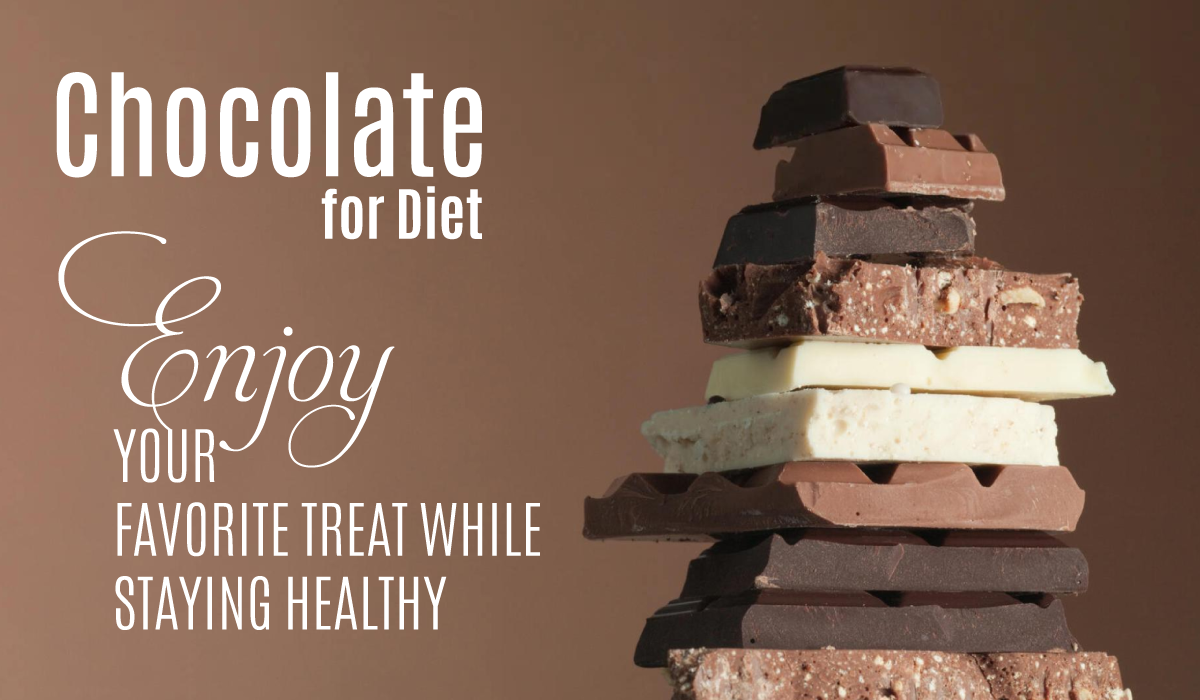
Chocolate for Diet: How to Enjoy Your Favorite Treat While Staying Healthy
In a world where diet culture often dictates our food choices, the notion of enjoying chocolate while maintaining a healthy lifestyle might seem like a far-fetched dream. However, Chocolate for Diet: How to Enjoy Your Favorite Treat While Staying Healthy delves into the harmonious relationship between chocolate and health, debunking common myths and unveiling how this beloved treat can fit into a balanced diet. Explore the sweet, guilt-free balance between indulgence and wellness, proving that health and happiness can coexist, one chocolate bite at a time.
Role Of Chocolate in Diet
When we think of dieting, chocolate often lands on the "avoid" list. Yet, the narrative around chocolate, particularly dark chocolate, is shifting. Far from being a dietary villain, chocolate, in moderation, can offer significant health benefits. Rich in antioxidants and capable of supporting heart health, chocolate is carving a niche for itself as a beneficial component of a balanced diet. Let's delve into how enjoying this sweet indulgence can align with health-conscious eating habits. Interestingly, the concept of chocolate for diet is becoming more accepted as we understand its benefits when consumed wisely.
The Sweet Truth: Chocolate's Role in a Healthy Diet
Chocolate, especially the dark kind, is more than just a treat. It's packed with plant nutrients called flavonoids, which are good for your heart. These nutrients help keep your heart healthy by improving blood flow and lowering blood pressure. Eating chocolate in small amounts can actually be a part of a healthy diet. It's not about eating lots of it but enjoying a little bit of chocolate now and then can be good for you.
Decoding Dark Chocolate: Benefits for Heart Health
Dark chocolate is a heart-healthy choice for those looking to add a bit of sweetness to their diet. Packed with powerful antioxidants, dark chocolate helps to improve blood flow and lower blood pressure, contributing to overall heart health. Including a small amount of dark chocolate in your diet can be a delicious way to support your cardiovascular system, making it a guilt-free indulgence for those mindful of their heart health. This aligns with the emerging trend of incorporating chocolate for diet into health-conscious eating plans.
Chocolate and Mood: A Delightful Boost for Your Well-being
Eating chocolate can be a real mood booster. The sweet flavors and rich texture trigger the release of feel-good chemicals in the brain, like serotonin, often leading to an immediate lift in spirits and a decrease in stress. This delightful effect makes chocolate not just a treat for the taste buds but also a simple, effective way to enhance your overall well-being, adding a little joy to your daily routine.
Antioxidants in Chocolate: Fighting Free Radicals with Flavor
Chocolate is not just delicious; it's also loaded with antioxidants that help fight off free radicals, molecules that can damage cells and lead to disease. These antioxidants, such as flavonoids found in cocoa, offer a tasty way to protect your body, supporting everything from heart health to reducing inflammation. Enjoying chocolate can be a flavorful addition to a health-conscious lifestyle, offering both pleasure and protection with every bite.
Flavonoids: Enhance heart health, improve blood flow, and lower blood pressure.
Polyphenols: Reduce inflammation and may lower the risk of various diseases.
Weight Management: How Chocolate Can Be a Smart Choice
Satisfies Cravings: Small portions of dark chocolate can fulfill sweet cravings, reducing the likelihood of overindulging in less healthy options.
Rich Flavor: The intense flavor of dark chocolate means a little goes a long way, helping to manage portion size and total calorie intake.
Metabolism Boost: Flavonoids in dark chocolate may enhance metabolism, aiding in more efficient calorie usage.
Appetite Control: Components in dark chocolate can help regulate appetite, potentially leading to less overall calorie consumption.
Healthier Choice: Opting for dark chocolate with high cocoa content and low added sugars supports weight management goals while allowing for indulgence.
Mindful Munching: Portion Control and Chocolate Consumption
Embracing mindful munching, especially with chocolate, is about enjoying this treat in moderation while practicing portion control. It's the key to integrating chocolate into your diet without compromising your health or weight management goals. By paying attention to the size and frequency of your chocolate indulgences, you can satisfy your sweet tooth and reap the benefits of chocolate's antioxidants without overindulging. This approach allows you to enjoy chocolate as a part of a balanced lifestyle, embodying the principle of chocolate for diet in every bite.
Here's a simple guide for moderate chocolate consumption:
These portions are meant to serve as a guideline for enjoying chocolate as part of a healthy, balanced diet.
The Cocoa Connection: Chocolate's Impact on Brain Health
The connection between cocoa and brain health is a fascinating area of research, revealing that chocolate, particularly dark chocolate rich in cocoa, has a positive impact on cognitive functions. Cocoa flavonoids are known to improve blood flow to the brain, which can enhance brain function and potentially protect against cognitive decline. Consuming chocolate in moderation could support memory, attention, and mood, making it a delightful addition to a diet focused on maintaining brain health. This insight opens up a sweet pathway to not just indulging in chocolate for pleasure, but also for its cognitive benefits.
A Dieter's Guide to Decadence: Balancing Chocolate in Your Meal Plan
For dieters looking to enjoy chocolate without straying from their meal plans, the key is balance and moderation. Incorporating chocolate into your diet doesn't mean overindulgence; it's about making smart choices that align with your health goals. Here's a simple guide to help you enjoy chocolate responsibly:
Best Chocolates for Diet
Hearts Coeurs Milk Chocolate: A creamy milk chocolate that offers a rich, velvety texture. Its milk content provides calcium, contributing to bone health.
Ghirardelli Intense Dark Chocolate: Features various cocoa levels for tailored taste; its antioxidants support heart health.
Ritter Sport Chocolate Dark Whole Hazelnuts: This bar combines dark chocolate with whole hazelnuts, offering a good source of antioxidants and healthy fats.
KitKat: Known for its crisp wafer layers covered in smooth milk chocolate, KitKat provides a quick energy boost due to its carbohydrate content.
Godiva Dark Chocolate: Luxurious, rich, and smooth, offering mood-boosting effects from its cocoa content.
Milka Strawberry Chocolate: A unique blend of milk chocolate with strawberry filling, offering vitamin C from the strawberries and a mood-lifting experience from the chocolate.
Lindt Chocolate: Lindt dark chocolate is rich in cocoa, providing flavonoids that support heart health and improve blood flow.
Twix: Features caramel and biscuit covered in milk chocolate, offering a satisfying mix of textures and a quick source of energy.
Conclusion:
Incorporating chocolate into your diet can be both a delightful and smart choice, offering benefits ranging from heart health to mood improvement. By choosing the right type and portion of chocolate, you can enjoy this indulgence without compromising your dietary goals. For a selection of quality chocolates that fit perfectly into a balanced diet, visit the Esajee website to explore their collection and make a purchase that suits your health and taste preferences. Their selection embodies the concept of chocolate for diet, catering to those who value both health and flavor in their chocolate choices.
Frequently Asked Questions
Is chocolate compatible with a healthy diet?
Yes, chocolate can be part of a healthy diet when consumed in moderation and as part of a balanced eating plan.
How can chocolate be included in a diet without hindering weight loss?
Opt for small portions of dark chocolate, which contains less sugar and higher cocoa content. Incorporate it as an occasional treat and balance it with nutrient-dense foods.
What types of chocolate are best for dieting?
Dark chocolate with at least 70% cocoa content is the best choice for dieting, as it contains less sugar and more antioxidants compared to milk or white chocolate.
Are there health benefits to eating dark chocolate while dieting?
Yes, dark chocolate has been linked to various health benefits, including improved heart health, better cognitive function, and reduced inflammation, thanks to its high antioxidant content.
How can I enjoy chocolate in moderation for weight management?
Practice mindful eating by savoring small portions of chocolate and focusing on its taste and texture. Incorporate it into your diet occasionally and balance it with nutritious foods to maintain a healthy weight.






